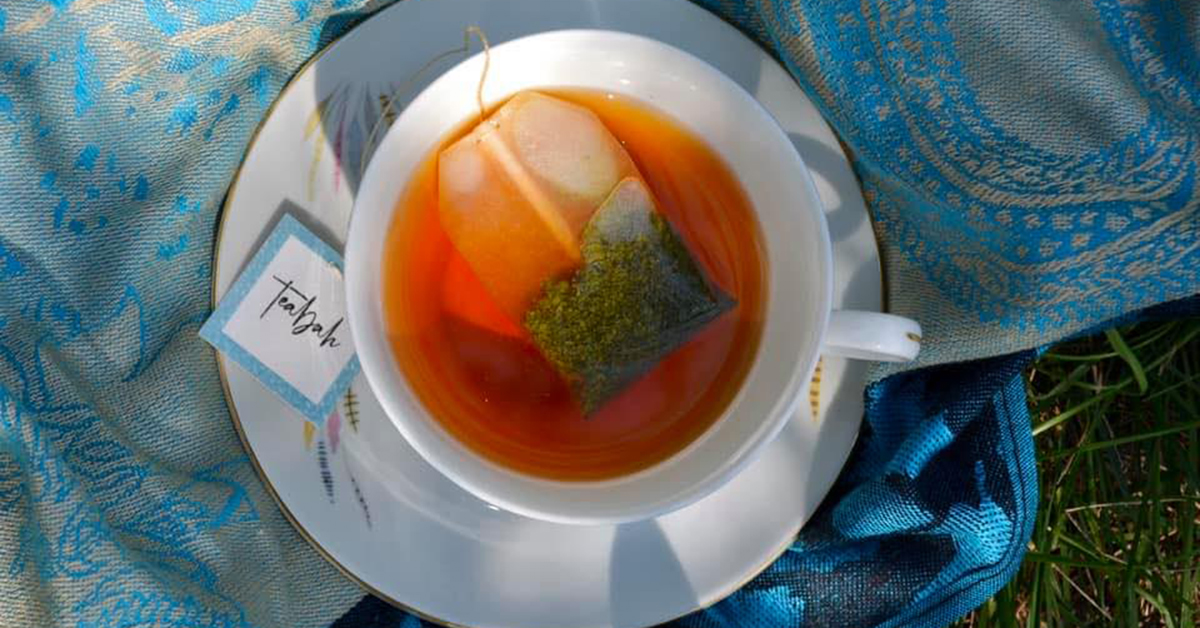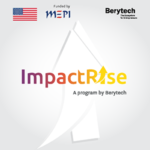
Teabah is a local tea brand that uses high-quality ingredients planted and cultivated in Lebanon with the social impact of preserving and highlighting a natural heritage. The startup works on empowering and supporting women while encouraging the usage of unexploited lands in rural areas and the introduction of new products for farmers to plant and cultivate.
We met with Bouchra Hassanieh, a visual artist and an avid tea drinker who talked to us about founding Teabah, with the passion to share the taste of Lebanon’s rich nature, while also making a difference in the lives of the people in her community.
A story of kindness
“I’m a big tea drinker but whenever I drank commercial tea, I always felt that there was something off about what I was drinking. I live in a rural area surrounded by a beautiful nature full of aromas, colors and textures, but I wasn’t able to relate what I was consuming to what I was experiencing,” explains Bouchra. “I started making my fresh tea blends sourced from the nature around me, they became my precious gifts to friends and family who welcomed them happily. Five years later I launched Teabah.”
“I did a quick market research and I discovered that Lebanon imports nearly all of the tea that it consumes although we have a wide variety of plants and herbs that grow in nature, we have people who want and need to work and we have land that could be planted. This is when I decided that this cup of tea will be a cup of change.”
“I launched the brand a year ago and decided to call it Teabah to reflect the uniqueness of our culture, our nature, people with very kind hearts in our communities, they have ‘teabah’ in them.”
Fresh Tea Production
The blends that Teabah offers are all green-based infused with herbs to elevate the taste. “We searched for what the Lebanese nature provides us with and tried to highlight this flavor in our tea, be it lemongrass, sage, lavender, or rosemary. We use seasonal ingredients like roses, jujube, and berries.” The brand has two main flavors and other seasonal flavors available to buy loose in glass jars or teabags packaged in cardboard or wooden hand-crafted boxes.
Teabah is built on a decentralized production program. Tea plants are provided to women who are then trained on caring for them and cultivating them. The startup then buys the crops, processes, blends, and packages them. To maintain production during wintertime, Bouchra plants in a greenhouse recently built for Teabah, while she contemplates collaborating with big farmers as she works to scale her business.
She has recently opened her workshop in Ein W Zein, Shouf to the public, inviting people to pass by for a cup of tea during the weekend.
Startup Challenges
One year into launching her startup, Bouchra was faced with sourcing, packaging, and distribution challenges. “It is not easy to go to traditional farmers, who are the core of our impact, with a new idea and a new product and convince them to plant it or invest in it. They prefer sticking to what is familiar, so collaborating is a leap of faith for both of us.”
Another challenge directly related to the economic crisis is the inflated packaging cost that is surpassing the cost of raw material and labor. To counter that, Bouchra is encouraging her clients to bring their empty jar for a refill at the workshop. However, despite the disadvantages, the increase in import prices played to the advantage of small producers like Bouchra whose products have become more competitive pricewise.
“Our prices have become very affordable compared to the price of imported tea blends. People can now buy an excellent quality of local fresh tea that is 100% natural at almost the same price as an imported tea. We are keen on keeping high-quality standards from the tea leaves to the bags that are made of 100% cotton fabric hand-sewn by women in our community.”
Bouchra does not want to dilute her brand by placing it in common retail shops with an extensive offering. She rather prefers approaching health food shops with a more specific clientele. Although she has been delivering directly to clients for the past year, Bouchra is preparing for the production and logistics challenges of scaling up her distribution to commercial shops.
Becoming a Social Entrepreneur
“The journey to becoming an entrepreneur is full of risks and excitement at the same time and a lot of responsibility. I created Teabah in 15 days. I was taking a social entrepreneurship course where we had to come up with our idea and work on it. In these 15 days I came up with the idea, I created the business model and I designed the brand. In the final presentation, I had the prototype ready with the branding and the brochures.
Bouchra’s journey into entrepreneurship first started with the UNICEF-developed Generation of Innovation Leaders program (GIL), hosted by Rural Entrepreneurs in September 2019, in which she learned how to do the fundamental design thinking and business development of her startup idea. “GIL then continued supporting my venture financially and through training under the Nawaya network, that also had a major role in our progress through their financial and consulting support. My Mentor at Rural Entrepreneurs Dana Abou Chakra played a core role in the development of my venture. I was introduced to the Impact Rise Program at Berytech through Park Innovation team who contributed a lot in the selection of my venture in entering the program.”
Teabah’s impact orbits around highlighting and preserving our natural heritage. In Lebanon, people are familiar with coffee, but tea and herbs are less commonly consumed. We have our zhourat, which is a random blend without any particular recipe, with ingredients that are not familiar to many and the bags are never well branded. Our nature provides us with a precious variety of herbs that grow and die every season. Some women pick them and use them for Mouneh, and this is it. Our end goal is to plant more lands with those herbs and to preserve the herbs and highlight them. This is our main impact. The spillover of our activity is employing women in rural areas. They can work in a safe environment from their homes. We provide them with plants that don’t need a lot of work or attention while they increase the green areas in their gardens and get the extra money. We are helping them with their financial status and giving them independence.”
Joining Impact Rise
“Being enrolled in Berytech’s Impact Rise Program is an amazing journey. It helped me elevate my whole business and impacted me on a personal level. Being selected for the program was a big deal for me especially since I was the youngest entrepreneur. I can still remember how terrified I was on the first day of the bootcamp. I remember thinking what if I can’t pull this off? I worked hard to gain the knowledge and the skills that the program offers and worked with the coaches and mentors to overcome the challenges along the way, especially that business management does not fall in my comfort zone. The program gave me a method of thinking, it taught me how to keep my impact as a priority and how to work to reach the end goal that I have,” confirms Bouchra.
“I have a special connection with Boushra’s project as it is not only a back to the land project, which is highly needed in our current time and essential at the level of the food security front, but it is also inclusive of the community where it operates. Its social impact is direct and creates a circular economy in the regions. Boushra is passionate about her teas, reviving the Lebanese herbs as well as creating a tea culture. The story behind her product is powerful and has a great prospect on in markets both locally and abroad,” details Christine Francis, a mentor in the Impact Rise program.
Patricia Kebbe, coach in the Impact Rise program talks about the uniqueness of Teabah’s social impact: ”It lies in its ‘collective production model’ whereby rural women are trained to plant and harvest aromatic herbs and plants in their unused and derelict lands then blends are carefully mixed into wholesome and value-added 100% local tea flavors, not a single ingredient is imported! I believe that Teabah will stand the test of time locally and in export markets as it has a strong value proposition and its scalability has been well studied to answer the growing demand for socially engaged brands with purpose.”
Teabah Thoughts
“When drinking Teabah, I want people to think of the cup of tea that their grandmother would serve them and all the sensations behind it: their grandmother’s kindness, the layers of flavors they tasting; I want them to feel something emotional that pulls them close to their identity, their country and to its nature, so they can feel that this flavor belongs to where to where they are.”
About the Impact Rise Program
 The Teabah team is currently enrolled in Berytech’s Impact Rise Social Innovation Program, which is funded by the U.S.-Middle East Partnership Initiative (MEPI).They are among 16 chosen teams who joined the startup scaling track. They were chosen based on the startup’s business and innovation potential, business model, scalability, team compatibility and expertise, as well as their ultimate social and environmental impact. They are being coached by Patricia Kebbe, and mentored by Christine Francis, Mirna Abboud and Andre Abi Awad. All four experts are also enrolled in the Impact Rise Program.
The Teabah team is currently enrolled in Berytech’s Impact Rise Social Innovation Program, which is funded by the U.S.-Middle East Partnership Initiative (MEPI).They are among 16 chosen teams who joined the startup scaling track. They were chosen based on the startup’s business and innovation potential, business model, scalability, team compatibility and expertise, as well as their ultimate social and environmental impact. They are being coached by Patricia Kebbe, and mentored by Christine Francis, Mirna Abboud and Andre Abi Awad. All four experts are also enrolled in the Impact Rise Program.







